Karl Brandt
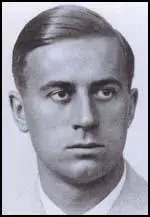
Karl Brandt was born in 1904. He became a doctor and in August 1933, was summoned to Upper Bavaria to treat Wilhelm Bruckner, Hitler's adjutant's, who had been hurt in an automobile accident. Adolf Hitler was so impressed with his work that he invited Dr. Brandt to become his personal physician.
Brandt joined Hitler's inner circle and was given the rank of major-general in the Waffen-SS. He was also appointed Reich Commissioner for Health and Sanitation.
In 1935 Heinrich Hoffman recommended that Adolf Hitler should be examined by Dr. Theodor Morell. Morell claimed Hitler was suffering from "complete exhaustion of the intestinal system" and recommended treatment of vitamins, hormones, phosphorus, and dextrose.
Brandt warned Hitler he was in danger of being poisoned by these large dosages of drugs and vitamins. Hitler rejected Brandt's advice and replied: "No one has ever told me precisely what is wrong with me. Morrell's method of cure is so logical that I have the greatest confidence in him. I shall follow his prescriptions to the letter." Later he was to remark: "What luck I had to meet Morell. He has saved my life."
Brandt was responsible for the Law for the Protection of Hereditary Health that was used to introduce compulsory sterilization. In August, 1939 the Reich Committee for the Scientific Registration of Serious Hereditary and Congenially Based Diseases was established. Euthanasia was employed to deal with the incurably insane or the physically handicapped. Brandt and Philip Bouhler were put in charge of this programme that Hitler said would result in the "racial integrity of the German people."
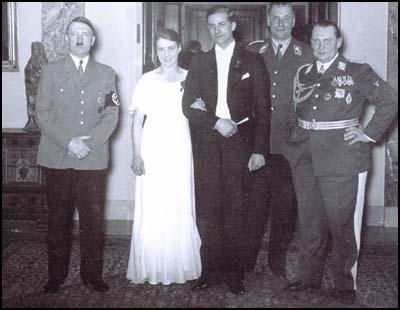
The euthanasia programme was known as T-4 and began in autumn 1939. According to Ulf Schmidt, the author of Karl Brandt: The Nazi Doctor, the first person to die as a result of the T-4 programme was Gerhard Kretschmar, a child born on 29th February 1939. Documents show that the parents, who lived in the south-eastern region of Saxony, petitioned Adolf Hitler asking for the child to be "put to sleep". Brandt claimed "it was a child who was born blind, an idiot - at least it seemed to be an idiot - and it lacked one leg and part of one arm."
Carbon monoxide gas was selected as the means of death and several asylums were equipped with chambers for this purpose. Between October 1939 and August 1941, T-4 killed over 70,000 people. As the Second World War progressed the euthanasia program was used to exterminate people said to be biologically inferior, such as Jews, Poles, Russians and Gypsies.
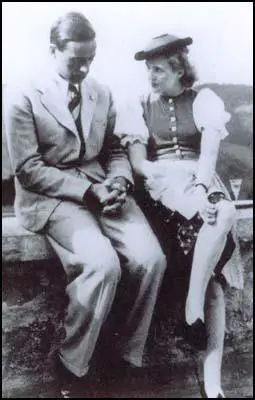
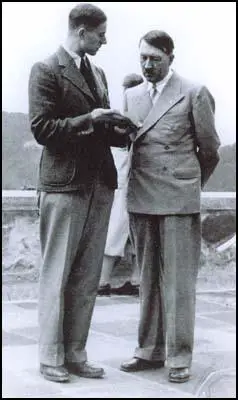
On 16th April, 1945, Adolf Hitler discovered that Brandt had sent his wife and children to Thuringia in order to surrender to the advancing American forces. Hitler was furious and he ordered that Brandt be charged with treason. Found guilty, Brandt was condemned to death. His life was saved by Heinrich Himmler who managed to delay the execution until he was arrested by the Allies at the end of the war.
Brandt was one of the defendants in the trial of 23 SS physicians and scientists that began at Nuremberg on 9th December, 1946. Alongside him stood Viktor Brack, another senior member of the euthanasia programme.
In court he was asked why he followed instructions to carry out medical experiments on patients. Brandt argued: "Would you believe that it was a pleasure to me to receive the order to start euthanasia? For fifteen years I had laboured at the sick-bed and every patient was to me like a brother, every sick child I worried about as if it had been my own. And then that hard fate hit me. Is that guilt? Was it not mv first thought to limit the scope of euthanasia?... With the deepest devotion I have tortured myself again and again, but no philosophy and no other wisdom helped here. There was the decree and on it there was my name. I do not say that I could have feigned sickness. I do not live this life of mine in order to evade fate if I meet it. And thus I affirmed Euthanasia. I realise the problem is as old as man, but it is not a crime against man nor against humanity. Here I cannot believe like a clergyman or think as a Jurist. I am a doctor and I see the law of nature as being the law of reason. From that grew in my heart the love of man and it stands before my conscience." The court was unimpressed and Brandt was sentenced to death.
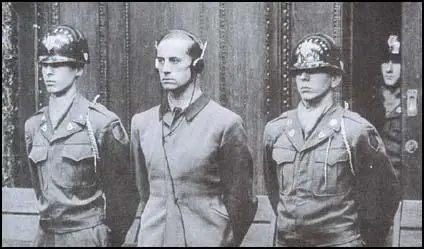
Before he was executed, Brandt wrote a letter to the authorities: "In order to raise the significance of this death sentence above the level of mere execution of a judicial principle to the level of a deliberate act in the interest and to the benefit of mankind, I am of my free will willing to submit myself to a medical experiment offering no chance of survival." The offer was rejected.
Karl Brandt was hanged on 2nd June 1948. As the black hood was placed over his head he said: "How can the nation which holds the lead in human experimentation in any conceivable form, how can that nation dare to accuse and punish other nations which only copied their experimental procedures? And even euthanasia! Only look at Germany, and the way her misery has been manipulated and artificially prolonged. It is, of course, not surprising that the nation which in the face of the history of humanity will forever have to bear the guilt for Hiroshima and Nagasaki, that this nation attempts to hide itself behind moral superlatives. She does not bend the law: Justice has never been here! Neither in the whole nor in the particular. What dictates is power. And this power wants victims. We are such victims. I am such a victim."
Primary Sources
(1) Ulf Schmidt, Karl Brandt: The Nazi Doctor (2007)
In the autumn of 1939, Karl Brandt and Philipp Bouhler, head of the Chancellery of the Fuehrer, were personally entrusted by Hitler to organize and implement the 'euthanasia' programme. The origins of the programme are complex, and scholars are still arguing over how it actually started. However, we have a clear idea with whom it started, namely with the most defenceless and vulnerable members of the population: children. Post-war testimony agrees that around 1939, a severely handicapped infant served as a pretext for Hitler to initiate the programme to kill the mentally and physically handicapped, a policy Hitler had wanted to implement since he had become Reich Chancellor, if not earlier. The precise sequence of events is thus of historical significance, not only with regard to the role of Brandt, but in understanding the mechanisms of decision-making in the high echelons of the Nazi leadership, and the powerful and mostly destructive dynamics which went along with it.
Until recently, the identity of the infant and exactly when it was killed were shrouded in mystery, amplified by the conflicting post-war testimony of those involved in the killing programme. It was believed that the infant, sex unknown, was called `Knauer', and that the case occurred in the winter of 1938, or at the latest at the beginning of 1939.1 Testimony seemed to agree that the infant was born blind and with severe handicaps, lacking one leg and part of an arm. Most of the physicians involved in the case diagnosed the infant as an idiot; but not all, and some stated that the baby suffered from convulsions. Other sources which could have corroborated the sequence of events were believed to have been mostly destroyed or lost. New research, however, enables us to reconstruct the identity of the infant, and the events which led to its death, with greater clarity.
A German medical historian, Udo Benzenhofer, has recently found out the name and sex of the child, but he is adamant that he cannot disclose this information because of strict German data-protection laws. He argues that historians should from now on call the case the 'child K' and that the main importance of his discovery lies in its factual value; in other words, that it is now safe to say that this child "really existed".
Although this approach is understandable and sensitive to the feelings of the parents and relatives of the child, it somehow overlooks the child itself and its individual suffering. Let us he precise in describing the context. The parents of this child wanted the child to be killed. According to the available evidence, they were ardent Nazis, who regarded their child's prospective life as "not worth living"; and saw to it that their child would be killed in accordance with Nazi ideology. By calling the case the "child K", we would not only medicalize the child's history, but also place the justifiable claim of the parents for anonymity above the personality and suffering of the first "euthanasia" victim.
I therefore wish to reveal the child's full identity: the child was a boy, born on 20 February 1939 in Pomben, a small village in the south-eastern region of Saxony. His name was Gerhard Herbert Kretschmar. In the spring of 1939, Gerhard's father, an agricultural labourer called Richard Gerhard Kretschmar of Pomben, consulted Werner Catel, the director of the University Children's Clinic in Leipzig, with a view to having the child admitted. Catel later claimed that the father had been concerned about the effect the child was having on the mother, Lina Sonja Kretschmar, and had asked him to admit the infant to his clinic with a view to `putting it to sleep: Catel apparently declined to do so because he felt it was illegal. The child's parents (probably the father), or a relative, then petitioned Hitler to grant permission to have the child killed. Such appeals were directed to Hitler's KdF, where similar requests had previously been lodged.
(2) Karl Brandt, statement made in 1946.
I always received such things. I only know that these requests were passed on to the Reich Ministry of the Interior. I myself know of only one request in the spring of 1939 which was sent to the Fuehrer himself through his Adjutant's office. The father of a deformed child approached the Fuehrer and asked that this creature should be killed. Hitler turned the matter over to me and told me to go to Leipzig immediately - it had taken place in Leipzig - to confirm the fact. It was a child who was born blind, an idiot - at least it seemed to be an idiot - and it lacked one leg and part of one arm.
(3) Werner Heyde, statement at Nuremberg (1947)
We were told that the euthanasia of the mentally ill should in practice be put into reality and we were asked to offer our support as experts and advisors. This meeting was followed by a series of meetings from September 1939 onwards. During these meetings Brack, Karl Brandt, Bouhler, Conti, and Linden were present, among others. The attendance of the aforementioned was not regular. At the meeting in September or October 1939 it became very clear to me and also for the others that Philipp Bouhler and Karl Brandt were the men in charge of the so called euthanasia programme.
(4) Karl Brandt, statement on 24th July 1945.
Within the powerful influences of external events of his time, Hitler adopted the intuition - his expression of the explanation of his idea of God - and with a logical deduction held within himself the conviction that he had been chosen to fulfil this `intuition: With that he was being entrusted with the task to rouse the German people, to secure their political and cultural place, and to become their "Leader" in the fight between views and developments of power in our time. The rest is National Socialism, born out of world-war comradeship, and moulded by Hitler. To this also belonged his idea that a generation which had lost a war had the duty to make good the burden caused by its own failure, and that it could not leave that burden as a heritage to their children and their children's children...
For those living in his time, there appeared enthusiasm, in a fascinating interchange which seemed to have the force of a physical law: people would give hours of increased service, willingness, and gratitude to the "Leader", and they perceived that he gave the same to them. Hitler spoke in a sovereign and often superhuman manner. The individual as well as the crowd felt, when facing this man, that his thoughts and acts were the fruit of genius, and this from the very beginning precluded any discussion. The broad flow of his vocabulary, and memory, which never seemed to fail, gave him extraordinary power. But also his external behaviour created an impression, and his directness was decisive, and overcame all doubts and arguments. His authority, established over the years by his numerous successes, and therefore accepted by all, inspired trust and confidence and dispelled any fear or panic. It became unquestioned that `Any wish of the Leader is an order'- indeed over time this acquired the force of law.
(5) Karl Brandt, interrogated on 1st October 1945
I think that everybody who has any imagination will turn away shudderingly (sic) from the misdevelopment of nature. These people live under cruel imagination and persecution manias, partly without any consciousness, and one can safely say that every one of these people if they for one clear moment would be able to see their real condition would be very grateful to be dead... I do not feel that I am incriminated. I am convinced that I can bear the responsibility for what I did in this connection before my conscience. I was motivated by absolutely humane feelings. I never had any other intention. I never had any other belief than that those poor miserable creatures-that the painful lives of these creatures were to be shortened. The only thing that I regret in this connection is that external circumstances brought it about that pain was inflicted on the relatives. But I am convinced that these relatives have overcome this sorrow today and that they themselves feel that their dead relatives were freed from suffering.
(6) Karl Brandt was interviewed by Leo Alexander on 26th November 1946.
Alexander: Why did the killing operation also included the mentally ill and epileptics, some of whom seemed to have been curable?
Brandt: They were the terminal cases. The things which I am [charged with], the documents which are with the prosecution somewhere, all this does not correspond to those things [that] we were interested in. It was the pure idea of Euthanasia, and in fact seen from the medical perspective. Therapeutic measures which are known and achievable could not help these patients any rnore. It was therefore also not possible to achieve a standstill in the development of the disease. The condition itself was agonising. That is a term "euthanasia" to deliver these humans from this condition.
Alexander: That was somehow the idealistic perspective?
Brandt: That was not the idealistic perspective.
Alexander: How did it happen that the term was somehow extended to Russian and Polish prisoners of war?
Brandt: I can only say that I do not know that. In 1941/42 - I cannot be sure of the date - essentially because - no not essentially, also because of the opposition from the churches the operation was halted, that means it was stopped. There may have been some other cases, but that this was somehow extended to prisoners of war or to conditions which did not correspond to what I previously outlined in general terms I don't know; it did not occur with my approval, nor with my knowledge and against all ideas which I personally hold, also not from Bouhler's agencies, who had the whole administrative apparatus.
Alexander. It can happen that this looks very beautiful from the green table, and be distorted in practice.
Brandt: Yes, without my knowledge.
Alexander: Did you make inspections?
Brandt: No, that was not my assignment; my assignment was to inform the Fuehrer. I accompanied him during the war.
Alexander: It was not your assignment to convince yourself that the things were carried out according to your guidelines?
Brandt: No.
Alexander: Those are somehow the difficulties of the administration. I am convinced that if you had inspected these things you would have found many faults.
Brandt: I don't know how, for example, Polish prisoners of war or anyone else ... should have been included.
Alexander: I can say, I came from the working camp in Hadamai; there was a special block.
Brandt: I've also heard about the procedure in Hadamar, I think in 1944 or 1943.
Alexander: I forget when it was, but this apparatus was used for that (killing of prisoners of War).
Brandt: It is simply a question by whom. I can only testify about something as long as this decree was in existence and involved Herr Bouhler and myself; according to the decree, all personnel matters were Bouhler's responsibility; he had the whole apparatus.
Alexander: I mean the practical effects of this thing, whether you would have necessarily agreed with them. There were, for example, epileptic children with birth defects whom one could have operated on. Euthanasia has been over-simplified.
Brandt: It depends when this happened and under what conditions and directed by whom. You see, I Cannot, if a Gauleiter - three times have I found this out from the Gaue, from the Gauleiter, anyway, in an area of the Gaue, the question was dealt with independently, 1944, 1945 - I cannot state the exact time - I received information from some official of the Reich Chancellery that euthanasia was carried out there, twice in the Gau of Saxony and once in the Gau of Pomerania. I had no knowledge, it did not occur as a result of my orders, and I did everything possible to slow it down. It was the only thing I could do, because I did not know anything beforehand or it occurred at a time when the programme had been halted and where I, because it had been halted, had nothing to do with this problem any more. I can imagine that some have claimed that Brandt was there; now we don't have anyone else and Brandt must have done it. More than stopping it, if I heard something that was not right, I could not do.
(7) Karl Brandt's diary (16th December, 1946)
I have just had an awful day. Viktor Brack has given an affidavit which is the most mendacious thing one can think of. I will grant him the benefit of stupidity, but such stupidity is dangerous. Previously I never would have believed this. But it is like that. Such stupidity is as unpredictable as madness! This man has testified and underwritten that the euthanasia problem is linked to the extermination of Jews in Poland and that this extermination was carried out with my approval. I still cannot find the right words. One - and especially I - have to be prepared for quite a lot, and every day there are little problems. But I was not quite prepared for such heavy stuff. Now I have spoken with S (Robert Servatius). Brack knows that his affidavit is false. His lawyer came to me and to S (Robert Servatius) in order to state this officially. But what is said cannot be unsaid. First it goes into the world! And I can never quite capture it again!"
(8) Karl Brandt's diary (9th January, 1947)
For the next weeks I am standing in front of the world with a face which, once looked at, is nothing but dreadful. I must withdraw into myself very much to appear freely! Even Brack's defence lawyer came to me and said that he will do what he can. But how little does this mean afterwards! Tomorrow [the news] races throughout the world that I am standing in the middle of it all, with a really devilish and grotesque face. That is disgusting. Brack himself has said that `he had become soft' when he signed the report! Is this now consolation? It is quite dreadful how humans can lose control of themselves for pomposity.. There I have no words any more. Because I am integrated into all this and powerless! I am feeling like I wrote three pages earlier, if I am accused in front of the world that I had starved children to death! I then feel as if I would hear this from Karl-Adolf. It revolts inside so that I could explode - and then exhausted I let my arms hang and fall: powerless! I am just powerless ... We all are. At such times you have to reach inside yourself, otherwise there is only one way out. So I reach into myself, and there I find a word of comfort, a feeling, a wish! If I nurture it, it comes to life - and so I find I can fight through and find myself again.'
(9) Karl Brandt, letter to his wife (8th July, 1947)
Why I did not know anything, well, the answer lies in the matter itself. The implementation was just none of my business. For this Bouhler had his organisation. He signed for it. However, the prosecution will now attempt to make me responsible, because only I am now here. Moreover, the prosecution will try to blame me for all the killings in the concentration camps and in Poland. I don't know how they propose to prove this... In any case, I would like to give you once more the inner reassurance that I was in no way informed about these things and that I in no way ever initiated anything even remotely of this nature. In retrospect, I have to add: what would have happened, if I had known? Could I have influenced it? Could it have been prevented? Not through me, I believe. Even my channels would have been limited: Hitler, Bormann, Bouhler - I could not have approached anyone else. So today I must say - whether it was for good or bad - that fate protected me from having to make difficult choices.
(10) Karl Brandt, statement in court (19th July, 1947)
Can I, as an individual, remove myself from the community? Can I be outside and without it? Could I, as a part of this community, evade it by saying I want to thrive in this community, but I don't want to sacrifice anything for it, not bodily and not with my soul? I want to keep my conscience clear. Let them try how they can get along...
Would you believe that it was a pleasure to me to receive the order to start euthanasia? For fifteen years I had laboured at the sick-bed and every patient was to me like a brother, every sick child I worried about as if it had been my own. And then that hard fate hit me. Is that guilt? Was it not mv first thought to limit the scope of euthanasia? Did I not, the moment I was included, try to find a limit as well as finding a cure for the incurable? Were not the professors of the Universities there? Who could there be who was more qualified?
With the deepest devotion I have tortured myself again and again, but no philosophy and no other wisdom helped here. There was the decree and on it there was my name. I do not say that I could have feigned sickness. I do not live this life of mine in order to evade fate if I meet it. And thus I affirmed Euthanasia. I realise the problem is as old as man, but it is not a crime against man nor against humanity. Here I cannot believe like a clergyman or think as a Jurist. I am a doctor and I see the law of nature as being the law of reason. From that grew in my heart the love of man and it stands before my conscience..
I am deeply conscious that when I said "Yes" to euthanasia I did so with the deepest conviction, just as it is my conviction today, that it was right. Death can mean relief. Death is life - just as much as birth. It was never meant to be murder. I bear this burden but it is not the burden of crime. I bear this burden of mine, though, with a heavy heart as my responsibility. Before it, I survive and prevail, and before my conscience, as a man and a doctor.
(11) Judgment of Karl Brandt at Nuremberg (20th August, 1947)
Karl Brandt admits that after he had disposed of the medical decision required to be made by him with regard to the initial program which he maintains was valid, he did not follow the program further but left the administrative details of execution to Bouhler. If this be true, his failure to follow up a programme for which he was charged with special responsibility constituted the gravest breach of duty. A discharge of that duty would have easily revealed what now is so manifestly evident from the record; that whatever may have been the original aim of the program, its purposes were prostituted by men for whom Brandt was responsible, and great numbers of non-German nationals were exterminated under its authority.
We have no doubt but that Karl Brandt - as he himself testified - is a sincere believer in the administration of euthanasia to persons hopelessly ill, whose lives are burdensome to themselves and an expense to the state or to their families. The abstract proposition of whether or not euthanasia is justified in certain cases of the class referred to, is no concern of this Tribunal. Whether or not a state may validly enact legislation which imposes euthanasia upon certain classes of its citizens, is likewise a question which does not enter into the issues. Assuming that it may do so, the Family of Nations is not obligated to give recognition to such legislation when it manifestly gives legality to plain murder and torture of defenceless and powerless human beings of other nations.
The evidence is conclusive that persons were included in the program who were non-German nationals. The dereliction of the defendant Brandt contributed to their extermination. That is enough to require this Tribunal to find that he is criminally responsible in the program.
We find that Karl Brandt was responsible for, aided and abetted, took a consenting part in, and was connected with plans and enterprises involving medical experiments conducted on non-German nationals against their consent, and in other atrocities, in the course of which murders, brutalities, cruelties, tortures and other inhumane acts were committed. To the extent that these criminal acts did not constitute War Crimes they constitute Crimes against Humanity...
The Military Tribunal finds and adjudges the defendant Karl Brandt guilty under Counts Two, Three, and Four, of the Indictment...
Karl Brandt, the Military Tribunal has found and adjudged you guilty of War Crimes, Crimes against Humanity, and membership in an organisation declared criminal by the judgment of the International Military Tribunal, as charged under the indictment heretofore filed against you. For your said crimes, on which you have been, and now stand convicted, the Military Tribunal sentences you, Karl Brandt, to death by hanging. And may God have mercy on your soul.
(12) Karl Brandt, letter to the authorities (21st August, 1947)
In order to raise the significance of this death sentence above the level of mere execution of a judicial principle to the level of a deliberate act in the interest and to the benefit of mankind, I am of my free will willing to submit myself to a medical experiment offering no chance of survival. Being convinced that some of my colleagues sentenced together with me will join in my plea, there will not only be the possibility of a single experiment, but that of a collective one. I appeal to the public of the whole world not only to support my request but to demand compliance with it.
(13) Karl Brandt, speech on the scaffold (2nd June, 1948)
How can the nation which holds the lead in human experimentation in any conceivable form, how can that nation dare to accuse and punish other nations which only copied their experimental procedures? And even euthanasia! Only look at Germany, and the way her misery has been manipulated and artificially prolonged. It is, of course, not surprising that the nation which in the face of the history of humanity will forever have to bear the guilt for Hiroshima and Nagasaki, that this nation attempts to hide itself behind moral superlatives. She does not bend the law: Justice has never been here! Neither in the whole nor in the particular. What dictates is power. And this power wants victims. We are such victims. I am such a victim.
